Issues Alert on Cartel Crude Oil Smuggling Schemes on the U.S. Southwest Border
WASHINGTON — Today, the Department of the Treasury’s Office of Foreign Assets Control (OFAC) sanctioned three Mexican nationals and two Mexico-based entities involved in a drug trafficking and fuel theft network linked to the Cartel Jalisco Nueva Generacion (CJNG). This network generates hundreds of millions of dollars annually, benefitting CJNG, through a slew of criminal activities, including fentanyl trafficking, fuel theft, and smuggling stolen crude oil from Mexico across the southwest border. Concurrently, Treasury’s Financial Crimes Enforcement Network (FinCEN) issued an Alert that provides financial typologies and red flags indicative of crude oil smuggling schemes on the U.S. southwest border associated with CJNG and other Mexico-based transnational criminal organizations.
“Fuel theft and crude oil smuggling are cash cows for CJNG’s narco-terrorist enterprise, providing a lucrative revenue stream for the group and enabling it to wreak havoc in Mexico and the United States,” said Secretary of the Treasury Scott Bessent. “Treasury, as part of the Administration’s whole-of-government effort, will continue to use all available tools to relentlessly target drug cartels and foreign terrorist organizations to Make America Safe Again.”
Click here to watch a video from Secretary Bessent on today’s action.
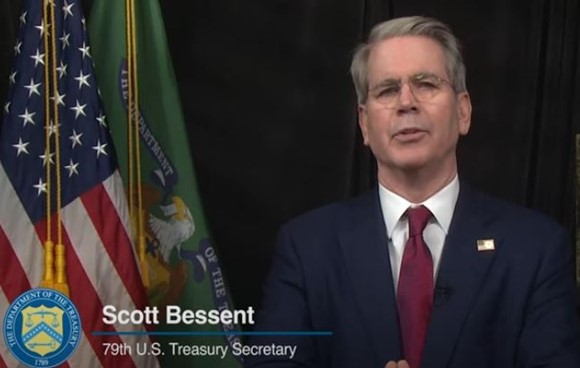
OFAC coordinated this sanctions action with the Drug Enforcement Administration (DEA); Homeland Security Investigations (HSI); Federal Bureau of Investigation (FBI); U.S. Customs and Border Protection; FinCEN; and the Government of Mexico, including La Unidad de Inteligencia Financiera (UIF), Mexico’s Financial Intelligence Unit.
Similarly, FinCEN coordinated its Alert with DEA, FBI, HSI, and OFAC. FinCEN’s Alert is one of several other recent FinCEN advisory and analytic products on revenue streams and illicit activity associated with Mexico-based transnational criminal organizations, to include the procurement of fentanyl precursor chemicals and fentanyl-related threat patterns and trends; timeshare fraud; human smuggling along the southwest border; and bulk cash smuggling.
CJNG: VIOLENT DRUG CARTEL AND FOREIGN TERRORIST ORGANIZATION
CJNG is a U.S.-designated Foreign Terrorist Organization (FTO) and Specially Designated Global Terrorist (SDGT) as well as a violent Mexico-based drug trafficking organization. CJNG is responsible for a significant proportion of fentanyl and other deadly drugs trafficked into the United States. Mexico-based drug trafficking cartels such as CJNG have turned to fuel theft and crude oil smuggling in recent years, resulting in billions of dollars in lost revenue for the Mexican government. These schemes have grown into powerful revenue generators for CJNG, enabling their campaigns of narcotics trafficking in the United States and violence against Mexican government forces along the U.S. southwest border.
On February 20, 2025, the Department of State designated CJNG as an FTO and SDGT. Treasury previously sanctioned CJNG on April 8, 2015 pursuant to the Foreign Narcotics Kingpin Designation Act and on December 15, 2021 pursuant to Executive Order (E.O.) 14059, which targets the proliferation of illicit drugs and their means of production. OFAC has taken numerous actions against CJNG-linked individuals and companies for enabling drug trafficking, money laundering, and corruption.
FUELING CRIME: MEXICAN CARTELS, FUEL THEFT, AND CRUDE OIL SMUGGLING
Fuel theft, including crude oil smuggling, colloquially referred to in Mexico as huachicol,is currently the most significant non-drug revenue source for Mexican cartels and other illicit actors. Thieves in Mexico (known as huachicoleros) use a variety of means to steal fuel and crude oil from Mexico’s state-owned energy company, Petróleos Mexicanos (Pemex), primarily including bribing corrupt Pemex employees as well as illegally drilling taps into pipelines, stealing from refineries, hijacking tanker trucks, and threatening Pemex employees. Stolen fuel is sold on the black market around Mexico, the United States, and Central America. Stolen crude oil is smuggled into the United States through complicit Mexican brokers and often mislabeled as “waste oil” or other hazardous material to avoid scrutiny and evade taxes and regulations. The stolen crude oil is then delivered to complicit U.S. importers in the oil and natural gas industry operating near the U.S. southwest border, who sell it at a steep discount on the U.S. and global energy markets before repatriating the significant illicit profits back to the cartels in Mexico. In recent years, as Mexican cartels have become more involved in fuel theft related activities, the Mexican government has reported billions of dollars in lost revenue due to huachicol.
On September 10, 2024, OFAC sanctioned nine Mexican nationals and 26 Mexico-based entities linked, directly or indirectly, to CJNG’s fuel theft activities. Senior CJNG member Ivan Cazarin Molina (a.k.a. El Tanque) was among those previously designated.
CONTINUING TO EMPTY CJNG’S FINANCIAL FUEL TANKS
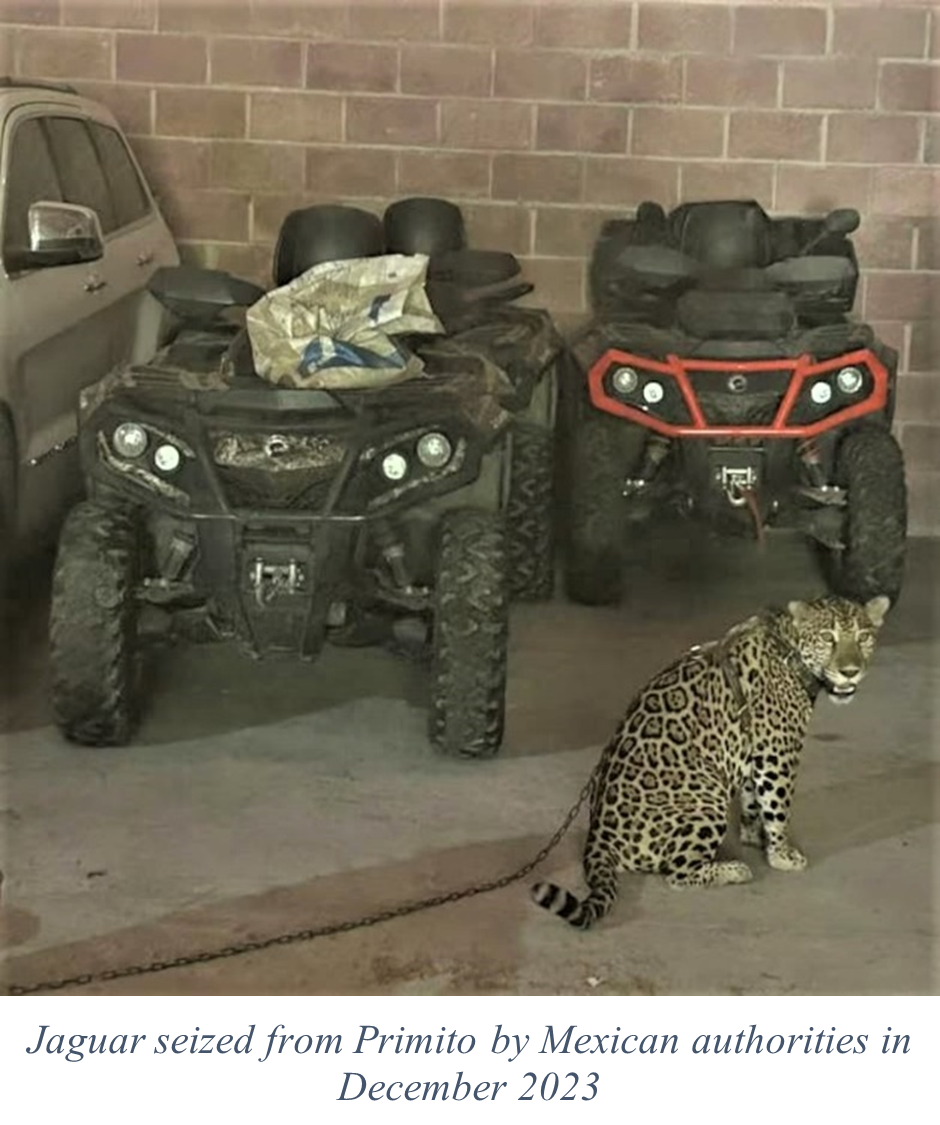 Building upon OFAC’s prior action, today OFAC designated another CJNG leader profiting from fuel theft, Cesar Morfin Morfin (a.k.a. Primito). Primito is the CJNG cell leader for Tamaulipas, Mexico. Primito previously led a faction of the sanctioned Cartel del Golfo and transformed it into a CJNG faction due to his close association with sanctioned CJNG leader Ruben Oseguera Cervantes (a.k.a. “El Mencho”). Primito is involved in the transportation, importation, and distribution of narcotics, including fentanyl, heroin, methamphetamine, cocaine, and marijuana, into the United States. He has also been known to import fentanyl and methamphetamine precursor chemicals sourced from China. Primito’s luxurious lifestyle has included ownership of exotic animals and dozens of luxury vehicles.
Building upon OFAC’s prior action, today OFAC designated another CJNG leader profiting from fuel theft, Cesar Morfin Morfin (a.k.a. Primito). Primito is the CJNG cell leader for Tamaulipas, Mexico. Primito previously led a faction of the sanctioned Cartel del Golfo and transformed it into a CJNG faction due to his close association with sanctioned CJNG leader Ruben Oseguera Cervantes (a.k.a. “El Mencho”). Primito is involved in the transportation, importation, and distribution of narcotics, including fentanyl, heroin, methamphetamine, cocaine, and marijuana, into the United States. He has also been known to import fentanyl and methamphetamine precursor chemicals sourced from China. Primito’s luxurious lifestyle has included ownership of exotic animals and dozens of luxury vehicles.
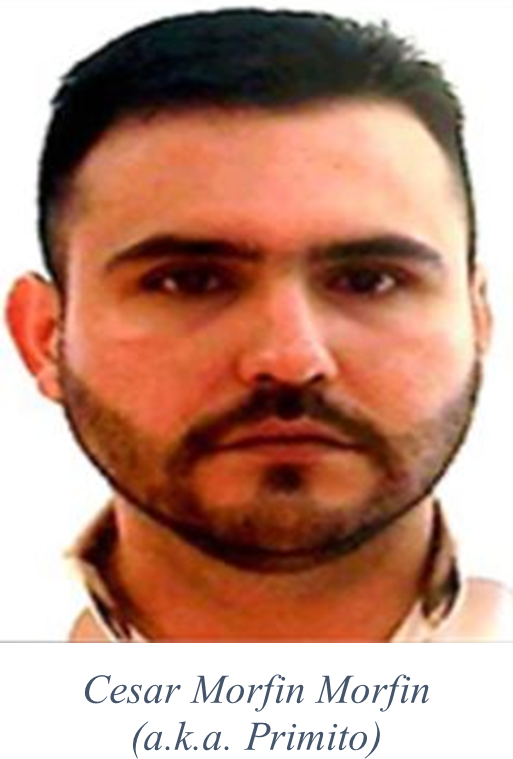 Recently, Primito and his network have refocused their criminal enterprise around stolen fuel-related activities, specifically the smuggling of crude oil into the United States given its high profit margins. Primito acquires stolen crude from various sources, including co-opted Pemex employees and other CJNG members. Given his control over port of entry bridges between the Tamaulipas and Texas border regions, Primito also charges fees to any trucks moving crude into the United States via these routes. His subordinates and associates assist him in falsifying official customs documents to aid in the cross-border smuggling of stolen crude oil. Additionally, Primito’s subordinates operate front companies on his behalf, some of which are used to sell stolen fuel to retail gas stations.
Recently, Primito and his network have refocused their criminal enterprise around stolen fuel-related activities, specifically the smuggling of crude oil into the United States given its high profit margins. Primito acquires stolen crude from various sources, including co-opted Pemex employees and other CJNG members. Given his control over port of entry bridges between the Tamaulipas and Texas border regions, Primito also charges fees to any trucks moving crude into the United States via these routes. His subordinates and associates assist him in falsifying official customs documents to aid in the cross-border smuggling of stolen crude oil. Additionally, Primito’s subordinates operate front companies on his behalf, some of which are used to sell stolen fuel to retail gas stations.
OFAC designated Cesar Morfin Morfin pursuant to E.O. 14059 for having engaged in, or attempted to engage in, activities or transactions that have materially contributed to, or pose a significant risk of materially contributing to, the international proliferation of illicit drugs or their means of production as well as for having acted or purported to act for or on behalf of, directly or indirectly, CJNG. Cesar Morfin Morfin is also being designated pursuant to E.O. 13224, as amended, for having acted or purported to act for or on behalf of, directly or indirectly, CJNG.
TARGETING PRIMITO’S PARTNERS
In addition to Primito, OFAC also designated two of his family members and business associates, who are linked to CJNG fuel theft.
 Alvaro Noe Morfin Morfin, Primito’s older brother, is also involved in narcotics trafficking. He played a leadership role within their Cartel del Golfo faction and helped to forge its alliance with CJNG. In 2021, he and Primito were included in a list of 10 Most Wanted criminals threatening peace and development in Texas and Tamaulipas jointly published by U.S. Customs and Border Protection and the Government of Mexico. Recently, Alvaro Noe Morfin Morfin has shifted to dealing primarily in stolen crude alongside Primito.
Alvaro Noe Morfin Morfin, Primito’s older brother, is also involved in narcotics trafficking. He played a leadership role within their Cartel del Golfo faction and helped to forge its alliance with CJNG. In 2021, he and Primito were included in a list of 10 Most Wanted criminals threatening peace and development in Texas and Tamaulipas jointly published by U.S. Customs and Border Protection and the Government of Mexico. Recently, Alvaro Noe Morfin Morfin has shifted to dealing primarily in stolen crude alongside Primito.
 Primito’s younger brother Remigio Morfin Morfin operates in Hidalgo, Mexico. He oversees plaza bosses and reports directly to Primito. In addition to narcotics trafficking, Remigio Morfin Morfin has also been involved in the theft of crude oil alongside his brothers. He supplies Primito with stolen crude from Hidalgo, Mexico.
Primito’s younger brother Remigio Morfin Morfin operates in Hidalgo, Mexico. He oversees plaza bosses and reports directly to Primito. In addition to narcotics trafficking, Remigio Morfin Morfin has also been involved in the theft of crude oil alongside his brothers. He supplies Primito with stolen crude from Hidalgo, Mexico.
OFAC designated Alvaro Noe Morfin Morfin and Remigio Morfin Morfin pursuant to E.O. 14059 for having engaged in, or attempted to engage in, activities or transactions that have materially contributed to, or pose a significant risk of materially contributing to, the international proliferation of illicit drugs or their means of production.
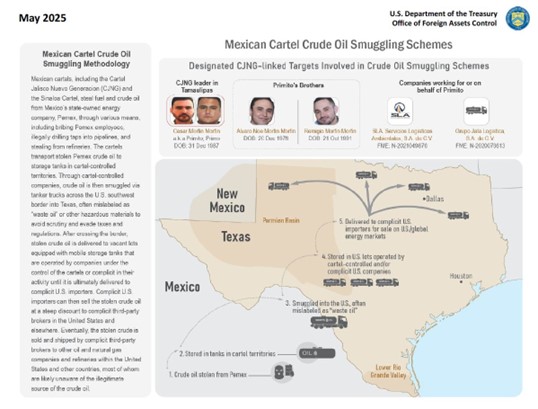
EXPOSING CRUDE OIL CONDUITS
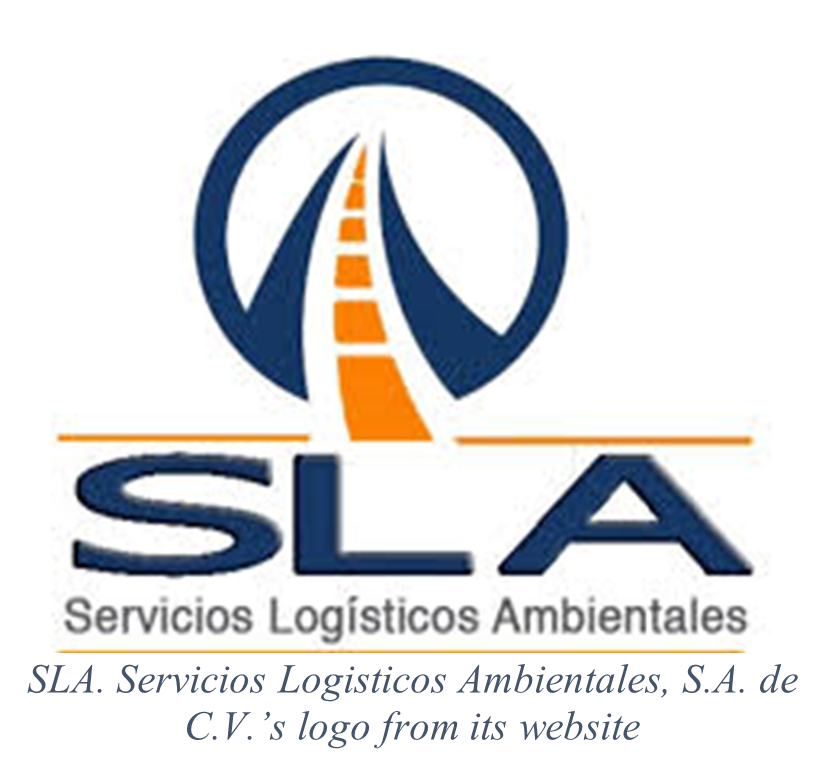 OFAC also designated two hazardous materials transportation companies: SLA. Servicios Logisticos Ambientales, S.A. de C.V. and Grupo Jala Logistica, S.A. de C.V. These companies operate, directly or indirectly, for Primito, and have engaged in the transportation of fuel and crude oil between Mexico and the United States. Companies transporting crude oil on behalf of individuals linked to Mexican cartels serve a key function in the huachicol enterprise.
OFAC also designated two hazardous materials transportation companies: SLA. Servicios Logisticos Ambientales, S.A. de C.V. and Grupo Jala Logistica, S.A. de C.V. These companies operate, directly or indirectly, for Primito, and have engaged in the transportation of fuel and crude oil between Mexico and the United States. Companies transporting crude oil on behalf of individuals linked to Mexican cartels serve a key function in the huachicol enterprise.
SLA. Servicios Logisticos Ambientales, S.A. de C.V. and Grupo Jala Logistica, S.A. de C.V. are designated pursuant to E.O. 14059 and E.O. 13224, as amended, for being owned, controlled, or directed by, or having acted or purported to act for or on behalf of, directly or indirectly, Cesar Morfin Morfin.
TREASURY’S EFFORTS TO COUNTER CARTEL FINANCING AND ACHIEVE THE TOTAL ELIMINATION OF CARTELS
Since President Trump directed the federal government to pursue the total elimination of cartels and other Transnational Criminal Organizations (TCOs), Treasury has leveraged its sanctions authorities and other tools to target Mexican cartels and other narcotics traffickers.
In addition to today’s action and the implementation of the FTO and SDGT designation of eight violent cartels and TCOs on February 20, 2025, Treasury has taken three sanctions actions targeting 11 individuals and six entities affiliated with the Sinaloa Cartel, La Nueva Familia Michoacana, and the Beltran Leyva Organization.
Beyond these efforts, Treasury sanctioned a leader of a human smuggling TCO operating at the U.S. southern border on March 18, 2025, and designated enablers of international narcotics trafficking by targeting the administrator of a once-notorious darknet marketplace on March 4, 2025, and a Swedish gang engaged in multiple criminal activities on March 12, 2025.
SANCTIONS IMPLICATIONS
As a result of today’s action, all property and interests in property of the designated persons described above that are in the United States or in the possession or control of U.S. persons are blocked and must be reported to OFAC. In addition, any entities that are owned, directly or indirectly, individually or in the aggregate, 50 percent or more by one or more blocked persons are also blocked. Unless authorized by a general or specific license issued by OFAC or exempt, OFAC’s regulations generally prohibit all transactions by U.S. persons or within (or transiting) the United States that involve any property or interests in property of designated or otherwise blocked persons.
Violations of U.S. sanctions may result in the imposition of civil or criminal penalties on U.S. and foreign persons. OFAC may impose civil penalties for sanctions violations on a strict liability basis. OFAC’s Economic Sanctions Enforcement Guidelines provide more information regarding OFAC’s enforcement of U.S. economic sanctions. In addition, financial institutions and other persons may risk exposure to sanctions for engaging in certain transactions or activities with designated or otherwise blocked persons.
Furthermore, engaging in certain transactions with Cesar Morfin Morfin; SLA. Servicios Logisticos Ambientales, S.A. de C.V.; and Grupo Jala Logistica, S.A. de C.V. entails risk of secondary sanctions pursuant to E.O. 13224, as amended. Pursuant to this authority, OFAC can prohibit or impose strict conditions on the opening or maintaining in the United States of a correspondent account or a payable-through account of a foreign financial institution that knowingly conducted or facilitated any significant transaction on behalf of a Specially Designated Global Terrorist.
Exports, reexports, or transfers of items subject to U.S. export controls involving persons included on the SDN List pursuant to E.O. 13224, as amended, may be subject to additional restrictions administered by the Department of Commerce, Bureau of Industry and Security. See 15 C.F.R. section 744.8 for additional information.
The power and integrity of OFAC sanctions derive not only from OFAC’s ability to designate and add persons to the SDN List, but also from its willingness to remove persons from the SDN List consistent with the law. The ultimate goal of sanctions is not to punish, but to bring about a positive change in behavior. For information concerning the process for seeking removal from an OFAC list, including the SDN List, please refer to OFAC’s Frequently Asked Question 897 here, and to submit a request for removal, click here.
To view the chart on the persons designated today, click here.
For more information on the individuals and entities designated today, click here.
###
